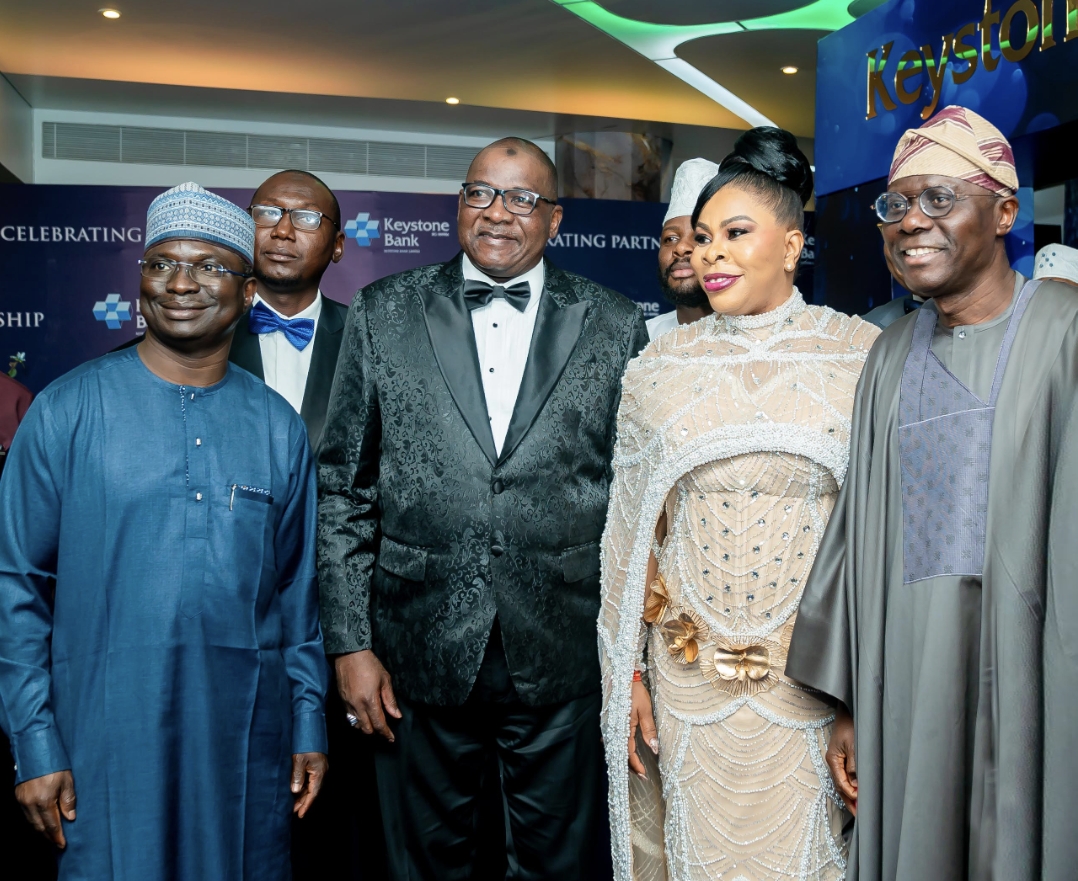Business
Sanwo-Olu, Lawal, others laud Keystone Bank’s strides at customers appreciation dinner

Sanwo-Olu, Lawal, others laud Keystone Bank’s strides at customers appreciation dinner
Keystone Bank Limited, a leading financial service provider in Nigeria, on Friday hosted an exclusive dinner event to celebrate and appreciate its loyal customers for their unwavering support throughout the year 2024.
The event, themed ‘Celebrating Partnership’ took place at the prestigious Eko Hotel and Suites in Lagos.

R-L: Mr. Babajide Sanwo-Olu, Executive Governor of Lagos State; Lady Ada Chukwudozie, Chairman, Keystone Bank Limited; Mr. Hassan Imam, Managing Director and CEO, Keystone Bank Limited and guests at the Bank’s end-of-year Customer Dinner, themed ‘Celebrating Partnership’, held at Eko Hotel & Suites, Victoria Island, Lagos, on Friday, December 13, 2024.
In her welcome remarks, chairman of Keystone Bank, Lady Ada Chukwudozie, expressed profound gratitude to the bank’s stakeholders and noted that the appreciation dinner is part of Keystone Bank’s broader strategy to engage with its customers on a personal level and reinforce its position as a trusted financial partner.
Also speaking, the Managing Director/CEO of the bank, Mr. Hassan Imam appreciated the bank’s customers, stakeholders and the staff for their commitments and resilience in making Keystone Bank a leading financial institution in the country.
“We have developed several products that have also been approved by the CBN. Monthly account opening has increased by over 150 per cent.
“In addition, under our Corporate Social Responsibility, working with the state governments, we set up the Keystone Bank Educational Support Initiative for the educational sector.
In the first phase, we executed projects in 12 states: Lagos, Zamfara, Ekiti, Anambra, Katsina, Kaduna, Ebonyi, Akwa Ibom, Rivers, Kano, Benue and Borno states.
In separate remarks, Lagos State governor, Mr. Babajide Sanwo-Olu and his Zamfara State counterpart, Dr. Dauda Lawal expressed heartfelt gratitude to Keystone Bank for its meaningful CSR initiatives in their states. Governor Lawal, in particular, lauded Keystone Bank as the first financial institution to visit Zamfara State and implement impactful CSR programmes. Both governors praised the visionary leadership of the bank’s CEO, Hassan Imam, for spearheading the remarkable transformation of the bank in such a short period. They further reaffirmed their commitment to continuing their partnership with the bank, recognizing its positive impact in their states and communities.
Other dignitaries who attended the event included the Deputy Governor of Benue State, Dr. Samuel Ode; former Governor of Sokoto, Senator Aminu Tambuwal; former Deputy Governor of Kano, Dr. Nasir Yusuf Gawuna and Presidential candidate of the Labour Party in the 2023 election, Mr. Peter Obi.
Also, on the roll call are the Emir of Zazzau, Mal. Ahmed Nuhu Bamalli; Senator Iyiola Omisore; Senator Ben Murray Bruce; Senator Abdullahi Gumel; Polaris Bank CEO, Omokayode Lawal; former IGP MD Abubakar; Alh. Isiyaku Abdullahi, Executive Vice President (EVP), Downstream, Nigerian National Petroleum Company Limited; former NEMA DG, Alh. Sani Sidi; Former Minister of Interior of Nigeria, Captain Emmanuel Iheanacho; Chief (Barr.) Uju Ifejika; Chisco Transport CEO, Dr. Chidi Anyaegbu and many others.
Business
Nigeria’s Inflation Drops to 15.10% as NBS Reports Deflationary Trend

Nigeria’s headline inflation rate declined to 15.10 per cent in January 2026, marking a significant drop from 27.61 per cent recorded in January 2025, according to the latest Consumer Price Index (CPI) report released by the National Bureau of Statistics.
The report also showed that month-on-month inflation recorded a deflationary trend of –2.88 per cent, representing a 3.42 percentage-point decrease compared to December 2025. Analysts say the development signals easing price pressures across key sectors of the economy.
Food inflation stood at 8.89 per cent year-on-year, down from 29.63 per cent in January 2025. On a month-on-month basis, food prices declined by 6.02 per cent, reflecting lower costs in several staple commodities.
The data suggests a sustained downward trajectory in inflation over the past 12 months, pointing to improving macroeconomic stability.
The administration of President Bola Ahmed Tinubu has consistently attributed recent economic adjustments to ongoing fiscal and monetary reforms aimed at stabilising prices, boosting agricultural output, and strengthening domestic supply chains.
Economic analysts note that while the latest figures indicate progress, sustaining the downward trend will depend on continued policy discipline, exchange rate stability, and improvements in food production and distribution.
The January report provides one of the clearest indications yet that inflationary pressures, which surged in early 2025, may be moderating.
Bank
Alpha Morgan to Host 19th Economic Review Webinar

Alpha Morgan to Host 19th Economic Review Webinar
In an economy shaped by constant shifts, the edge often belongs to those with the right information.
On Wednesday, February 25, 2026, Alpha Morgan Bank will host the 19th edition of its Economic Review Webinar, a high-level thought leadership session designed to equip businesses, investors, and individuals with timely financial and economic insight.
The session, which will hold live on Zoom at 10:00am WAT and will feature economist Bismarck Rewane, who will examine the key signals influencing Nigeria’s economic direction in 2026, including policy trends, market movements, and global developments shaping the local landscape.
With a consistent track record of delivering clarity in uncertain times, the Alpha Morgan Economic Review continues to provide practical context for decision-making in a dynamic environment.
Registration for the 19th Alpha Morgan Economic Review is free and can be completed via https://bit.ly/registeramerseries19
It is a bi-monthly platform that is open to the public and is held virtually.
Visit www.alphamorganbank to know more.
Business
GTBank Launches Quick Airtime Loan at 2.95%

GTBank Launches Quick Airtime Loan at 2.95%
Guaranty Trust Bank Ltd (GTBank), the flagship banking franchise of GTCO Plc, Africa’s leading financial services group, today announced the launch of Quick Airtime Loan, an innovative digital solution that gives customers instant access to airtime when they run out of call credit and have limited funds in their bank accounts, ensuring customers can stay connected when it matters most.
In today’s always-on world, running out of airtime is more than a minor inconvenience. It can mean missed opportunities, disrupted plans, and lost connections, often at the very moment when funds are tight, and options are limited. Quick Airtime Loan was created to solve this problem, offering customers instant access to airtime on credit, directly from their bank. With Quick Airtime Loan, eligible GTBank customers can access from ₦100 and up to ₦10,000 by dialing *737*90#. Available across all major mobile networks in Nigeria, the service will soon expand to include data loans, further strengthening its proposition as a reliable on-demand platform.
For years, the airtime credit market has been dominated by Telcos, where charges for this service are at 15%. GTBank is now changing the narrative by offering a customer-centric, bank-led digital alternative priced at 2.95%. Built on transparency, convenience and affordability, Quick Airtime Loan has the potential to broaden access to airtime, deliver meaningful cost savings for millions of Nigerians, and redefine how financial services show up in everyday life, not just in banking moments.
Commenting on the product launch, Miriam Olusanya, Managing Director of Guaranty Trust Bank Ltd, said: “Quick Airtime Loan reflects GTBank’s continued focus on delivering digital solutions that are relevant, accessible, and built around real customer needs. The solution underscores the power of a connected financial ecosystem, combining GTBank’s digital reach and lending expertise with the capabilities of HabariPay to deliver a smooth, end-to-end experience. By leveraging unique strengths across the Group, we are able to accelerate innovation, strengthen execution, and deliver a more integrated customer experience across all our service channels.”
Importantly, Quick Airtime Loan highlights GTCO’s evolution as a fully diversified financial services group. Leveraging HabariPay’s Squad, the solution reinforces the Group’s ecosystem proposition by bringing together banking, payment technology, and digital channels to deliver intuitive, one-stop experiences for customers.
With this new product launch, Guaranty Trust Bank is extending its legacy of pioneering digital-first solutions that have redefined customer access to financial services across the industry, building on the proven strength of its widely adopted QuickCredit offering and the convenience of the Bank’s iconic *737# USSD Banking platform.
About Guaranty Trust Bank
Guaranty Trust Bank (GTBank) is the flagship banking franchise of GTCO Plc, a leading financial services group with a strong presence across Africa and the United Kingdom. The Bank is widely recognized for its leadership in digital banking, customer experience, and innovative financial solutions that deliver value to individuals, businesses, and communities.
About HabariPay
HabariPay is the payments fintech subsidiary of GTCO Plc, focused on enabling fast, secure, and accessible digital payments for individuals and businesses. By integrating payments and digital technology, HabariPay supports innovative services that make everyday financial interactions simpler and more seamless.
Enquiries:
GTCO
Group Corporate Communication
[email protected]
+234-1-2715227
www.gtcoplc.com
-

 celebrity radar - gossips6 months ago
celebrity radar - gossips6 months agoWhy Babangida’s Hilltop Home Became Nigeria’s Political “Mecca”
-

 society6 months ago
society6 months agoPower is a Loan, Not a Possession: The Sacred Duty of Planting People
-

 society5 months ago
society5 months agoReligion: Africa’s Oldest Weapon of Enslavement and the Forgotten Truth
-

 news6 months ago
news6 months agoTHE APPOINTMENT OF WASIU AYINDE BY THE FEDERAL GOVERNMENT AS AN AMBASSADOR SOUNDS EMBARRASSING









